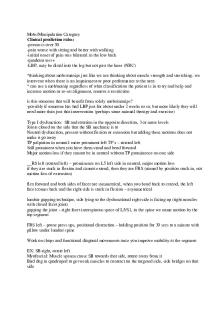SBNR 4-28 - Lecture notes Final Lecture PDF

| Title | SBNR 4-28 - Lecture notes Final Lecture |
|---|---|
| Author | Madeleine McDonald |
| Course | "Spiritual But Not Religious": Spirituality in America |
| Institution | University of Virginia |
| Pages | 5 |
| File Size | 43.7 KB |
| File Type | |
| Total Downloads | 94 |
| Total Views | 118 |
Summary
Class notes from last lecture of class ...
Description
4/28 In Conclusion
04/28/2014
-Rothko Chapel, Houston, TX place that identifies many themes of contemporary spirituality meeting place for different world religions we need a place to get away from images and world- similar to Thoreau and Walden
-Religion, Spirituality, Popular Culture religion and spirituality have been adapted to and defined by our cultural context of consumerism, world of images, popular culture experiences are shared with others, but often in ad-hoc communities
mass culture rooted in individual experience
Sports as religion o Shared experience, popular culture has taken function of religion; concerts, TV, movies are also part of this o Superstar athletes as super- human figures, think of how much people are willing to pay for memorabilia o Stadium is sight of wonder and pseudo spiritual o Baseball hall of fame- “entrance to sacred ground” o You can get buried in sports themed coffins o German football clubs have cemetery
-Sports as spirituality experience of “flow” or selflessness- transcendence, “losing oneself” ritual; sacred time and space; departure from ordinary rules of life key to sporting endeavor is not thinking enjoying each and every moment- not just when things are going your way
-Carrette and King vs. Schmidt you mind find some things you like, and some you don’t like or agree with Schmidt: largely optimistic and generous account of spirituality, attacks critics of spirituality, for example defense of Sheila Larson o Her phrase “be gentle to yourself” Schmidt says its from poetry and she didn’t just make this us, Sheila Larson is a community of members o Defense of spirituality- binds people together and provides meaning, transcendence and way to live meaningful life
Carrette and King: o Ways spirituality has been modified- too entagled with mass culture world of consumerism that it has been stripped of social focus o Stripped of its availabilities to offer its critique of the world
In some ways we can read these two books in stark opposition, or their could be some conversion o Lee Schmidt is cautious of white westerners borrowing from native Americans, Buddhism, etc. and turning their practices into commodities o Carrette and King in conclusion look to religion as a source for critique of materialism, there are places where we can see spirituality done right- Thich Naht Han
-Lingering questions Why “spirituality” ? What does this buzzword say about our cultural movement? o Something always happened related to this topic- for all of its elusiveness and vagueness, the fact that spirituality has become a buzzword is indicator of some longings o Reveals some serious anxieties and criticisms of religion o Shows criticisms of too political, corruption, lack of inclusion o SBNR shows how those critiques are real and longings for turn towards spiritual are real- got to be something more than material side of American dream
Is spirituality narcissistic? What’s wrong with a little narcissism anyways? o Yes it is, but it also depends o Emersonian- controversial because losing oneself but also focus of self o Also in businesses- sports and concert, so much of what is profound about these is losing yourself to something that’s bigger than you o Best collective experiences provide transcendence that then make you think “okay well now what?”
o If something is therapeutic and provides help and happiness then that is good- taking care of ourselves is a fundamental obligation
Can spirituality provide same resources and vantage point as religion to build community, and to advocate for needed change? Can spirituality stand outside or against American consumerism? o It depends o Schmidt wants to argue yes and say there’s a social and ethical component to spirituality
Why study this topic in college? o Intellectually interesting, really complicating questions in life (it depends questions) are questions that humanities are designed to help us address
04/28/2014
04/28/2014 ...
Similar Free PDFs

Final - Lecture notes ALL
- 31 Pages

Final Exam Lecture Notes
- 14 Pages

Tablas 3º - Lecture notes final
- 45 Pages

Final - Lecture notes all lectures
- 29 Pages

Final Review - Lecture notes All
- 4 Pages

MGTA01 - Final - Lecture notes All
- 16 Pages

Med surg final - Lecture notes
- 41 Pages

Lecture notes, lecture 3
- 5 Pages
Popular Institutions
- Tinajero National High School - Annex
- Politeknik Caltex Riau
- Yokohama City University
- SGT University
- University of Al-Qadisiyah
- Divine Word College of Vigan
- Techniek College Rotterdam
- Universidade de Santiago
- Universiti Teknologi MARA Cawangan Johor Kampus Pasir Gudang
- Poltekkes Kemenkes Yogyakarta
- Baguio City National High School
- Colegio san marcos
- preparatoria uno
- Centro de Bachillerato Tecnológico Industrial y de Servicios No. 107
- Dalian Maritime University
- Quang Trung Secondary School
- Colegio Tecnológico en Informática
- Corporación Regional de Educación Superior
- Grupo CEDVA
- Dar Al Uloom University
- Centro de Estudios Preuniversitarios de la Universidad Nacional de Ingeniería
- 上智大学
- Aakash International School, Nuna Majara
- San Felipe Neri Catholic School
- Kang Chiao International School - New Taipei City
- Misamis Occidental National High School
- Institución Educativa Escuela Normal Juan Ladrilleros
- Kolehiyo ng Pantukan
- Batanes State College
- Instituto Continental
- Sekolah Menengah Kejuruan Kesehatan Kaltara (Tarakan)
- Colegio de La Inmaculada Concepcion - Cebu







